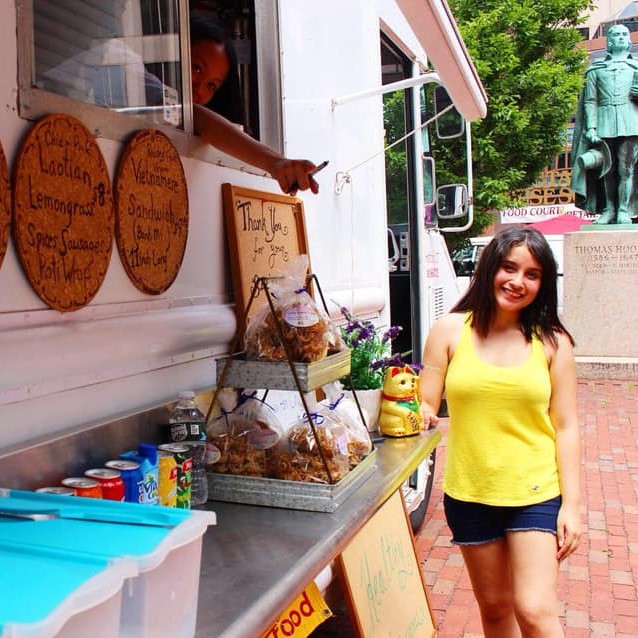Events
in the news ...
A local nonprofit, International Hartford, said it is awarding $80,000 in grants to 15 minority-owned businesses in the Hartford metro area.
The businesses will use the grants to finance capital equipment purchases, build-out their facilities and on marketing. Awards are up to $10,000 per business.
The recipients are:
- La Casita, Guatemalan restaurant
- Rolling Roti, Guyanese food truck
- Ital Juicery, Jamaican juices, vegan food and desserts
- Head Over Berries, juice bars
- Mask Down, recording studio
- Queen’s Fashion, African clothing
- Amarantha’s Hair Salon
- Art Food Live, West African food truck
- Key Bookstore, on-line bookstore for Black literature
- Anibok, Asian-African tea beverages
- Chef Walter, catering
- Da Last Drip, food sauces
- KH Action, car audio equipment
- AGP Global, event security
- Hive Builders, fatherhood education
The microgrant program, now in its second year, is funded by the Hartford Foundation for Public Giving and the Stanley D. and Hilda N. Fisher Fund.
International Hartford is a nonprofit organization that provides business counseling, access to capital and helps businesses navigate the regulatory environment.
15 Hartford minority-owned small businesses get $80K in grants to upgrade and expand
By Emily DiSalvo,Staff Writer, CT Insider Jan 30, 2024
HARTFORD — Back in Guyana, Sukeeta Baharally grew up watching her parents make and sell food — curry, roti, rice, and jerk chicken.
When the family came to the United States over 20 years to “try to do better,” Baharally had the idea to try to do the same here, but it took years. She and her husband opened Rolling Roti food truck in Hartford three years ago.
“You can imagine how long it takes you to get going,” Baharally said. “Because we (weren’t) sure how the food was going to be accepted by the community, how much people know about it. It was challenging at the beginning.”
In an effort to recognize the unique struggles immigrants face as entrepreneurs, International Hartford distributed a total of $80,000 in microgrants to businesses like Rolling Roti in hopes of fostering immigrant and minority entrepreneurship in the area.
“White folks tend to start at second base in terms of having inherited wealth and perhaps having higher education paid for and even folks at the same income level who are Black and Latino have considerably less wealth,” said Art Feltman, executive director of International Hartford. “And so a capital injection that we provide is of great value.”
Awards, funded by The Hartford Foundation for Public Giving and the Stanley D. and Hilda N. Fisher Fund, can be a maximum of $10,000 for each business. This is the second year of the microgrant program.
Feltman said the selection committee mainly looked for businesses that were already profitable but needed some support. But in some cases, they were intrigued by startup ideas, such as Anibok, an Asian-African tea company that received a grant.
“As for the startups or near startups, most commercial banks don’t lend to startups,” Feltman said. “So that makes the lack of personal assets more of a dilemma for minority-owned businesses.”
The committee included two bankers and an accountant, and they selected 15 of the approximately 30 applicants.
Rolling Roti got a grant along with other food-based businesses such as La Casita, a Guatemalan restaurant, and Ital Juicery, based in the Swift Factory. Baharally said they plan to use the grant to upgrade some of their equipment and improve their truck so they can serve a broader area.
“We will use it to buy improved equipment, improvements on the truck,” Baharally said. “We are going to do a suppression system so that we can go out of state to events. We just wanted to expand and so the grant really helps us do that.”
Right now, customers can find Rolling Roti parked in downtown Hartford and sometimes at One World Market near Hartford Hospital serving a variety of foods authentic to Guyana, including vegan and vegetarian options.
“Our small businesses really do benefit from these grants,” Baharally said.
Jan 30, 2024
Connecticut lawmakers OK Medicaid for children 12 and younger regardless of immigration status
By Jenna CarlessoCT Mirror•Children 12 years old and younger whose guardians meet the qualifying income limit will be eligible for Medicaid coverage regardless of their immigration status beginning Jan 1.
Included in the state budget that was adopted by the House and Senate was an expansion of the Medicaid program, known as HUSKY in Connecticut. Last year, lawmakers opened the program to children 8 and younger — regardless of immigration status — who come from households earning up to 201% of the federal poverty level (for a family of four, that’s $55,778). Children from households earning between 201% and 325% of the federal poverty level also qualify but are subject to an asset test.
This year, legislators expanded the pool to children 12 and younger and are allowing any child in that age group who signs up for coverage to keep the insurance through age 19. Children older than 12 on Jan. 1 would not be eligible.
Lawmakers have set aside $400,000 for this year’s expansion.
“The fact that this was able to be included in the budget shows the power our community has,” said Carolina Bortolleto, a volunteer with the HUSKY for Immigrants Coalition and a co-founder of Connecticut Students for a Dream. “And it shows that our legislators know this was the right thing to do.”
Bortolleto helped organize days of rallies outside the state Capitol this spring, bringing together undocumented residents, health care workers, high school students, advocates and others to call for an expansion of the Medicaid program.
Proponents had hoped the legislature would broaden the program this year to children 18 and younger, regardless of their immigration status, but the bill that would have done that did not advance beyond the Human Services Committee. It was defeated by a 10-10 tie vote, with every Republican and three of the committee’s 13 Democrats voting against it, including co-chair Rep. Cathy Abercrombie, D-Meriden.
Some legislators voiced concerns that the expansion was premature because of a lack of information on the number of residents who would qualify for the program and what the cost would be to the state.
After the bill died, lawmakers crafted a more modest expansion of HUSKY in the state budget. Despite a smaller financial commitment, the move angered some representatives who debated the budget in the House.
“That bill, in Human Services, failed. It failed with votes on both sides of the aisle, and we’re moving it forward,” said Rep. Jay Case, R-Winsted, during the House debate. “Is that the right process when something fails in committee? ‘OK, we’ll just put it in the budget.’ That’s where I have a problem.”
Language from failed bills or other proposals can sometimes end up in the budget implementer, even when the proposals have only a nominal connection to the budget.
Bortolleto said she and others will continue to advocate in future years for another broadening of Medicaid. She hopes all residents, regardless of age and of immigration status, will eventually be eligible.
“We’re recommitting to the fight, because health care is a human right. No one should be denied health care — a chance at survival — because of their immigration status, no matter their age,” she said.
Hundreds of people testified on the proposal or wrote to lawmakers this spring, many in support of expanding the Medicaid program.
“My son is a U.S. citizen, but my husband and I do not have HUSKY or any other health insurance because we are immigrants,” resident Sandra Aguilar wrote to legislators. “Having health insurance would be a huge help for us because we both need dental care … I had to spend $300 to get a tooth fixed at a private dentist. It took me a long time to get the tooth fixed because for my family, $300 is too much and we cannot afford it.
“My husband is prediabetic and has not been able to get the medical care he needs because every medical appointment comes with a cost that affects our finances.”
Karina Flores, a new Britain resident and student at Capital Community College, said her parents are uninsured and struggle to access health care.
“Coming from a Hispanic household, I firsthand witnessed the struggles my parents would have to go through just to be able to receive medical assistance,” she testified. “At times they wouldn’t even go to the doctor’s office for any checkups due to being low income and not having health insurance.”
“My mother was first diagnosed with type 2 diabetes when I was 18 years old, a senior in high school. Unfortunately, she didn’t have health insurance, which was super hard to pay for medications and doctor visits — which made me have to work extra hours to help her out,” Flores said. “We will never know when and why we are going to get sick. … We all deserve to have a source of medical help. Immigration status does not determine how much of a human we are.”
Jay Sicklick, deputy director of the Center for Children’s Advocacy, called this year’s expansion “progress.” Analysts project that opening HUSKY to kids 12 and younger would add 1,020 children to the program next fiscal year and 2,750 by 2024.
“You have to start somewhere. And if the starting point is [children] 12 and under, I think we’ve made some progress,” Sicklick said. “In a perfect world, one would think that insuring the entire cohort of individuals up to age 19 would be the primary focus … but at the end of the day, some progress is better than none. We’ll have to work diligently next year and in other future years to ensure … no one gets left behind.”
Jenna Carlesso is a reporter for The Connecticut Mirror (https://ctmirror.org/ ). Copyright 2022 © The Connecticut Mirror.
Karen Dworski: Children should have access to medical and mental health care regardless of immigration status
Tragically, thousands of Connecticut children don’t have access to medical and mental health care — no diagnosis, no treatment, no medication. Because of their immigration status, these children don’t qualify for the state’s HUSKY program, which provides mental health and medical services to poor families. This is despite the legislature’s bipartisan decision to address the need for youth mental health services, which was reported by The Courant on March 15.
Connecticut’s children are facing an unprecedented increase in mental health problems. Melissa Santos, division chief of pediatric psychology at Connecticut Children’s Medical Center, said: “The high rates of depression, one in four youth now experiencing symptoms of depression, one in five youth experiencing symptoms of anxiety, and perhaps most notably, which the advisory indicated we’re seeing here in Connecticut, is the number of kids ending up in the emergency room due to suicide attempts.” She goes on to state that racial and ethnic minority youth “are disproportionately impacted by mental health prior to the pandemic.”
As a mental health professional, I am alarmed at the preventable damage that is occurring among Connecticut’s children, including undocumented immigrant youth. We know that when mental health needs are not addressed, not only does this generation of children struggle, but future generations struggle, too. Mental health problems affect all aspects of life, such as performance in school, forming healthy relationships and maturing developmentally. Mental illness is painful not only to the child but also to all who love and care for them.
Connecticut can and must do better. Legislation enabling medical and mental health treatment through HUSKY for all income-eligible children, regardless of immigration status, is essential right now.
Last session, state legislators listened to medical professionals, the immigrant community and their allies when they passed legislation to open HUSKY to all children from birth to age 8, along with prenatal and postpartum care for pregnant women, in 2021. But what about older kids? Medical and mental health needs don’t disappear when a child turns 9. That’s why community groups are urging HUSKY access to age 18. Without HUSKY medical insurance, these kids won’t be able to receive the treatment that other Connecticut children get. And we are in the midst of a youth mental health crisis.
The issue of cost has been seen as an obstacle, but it is a false one. Undocumented immigrants pay $500 million in taxes yearly and only $10 million, 2% of that annual contribution, would cover the increase in HUSKY coverage to age 18. Clearly there is the money to support the HUSKY expansion.
U.S. Surgeon General Vivek H. Murthy issued an advisory on youth mental health, saying, “Our obligation to act is not just medical — it’s moral. I believe that, coming out of the COVID-19 pandemic, we have an unprecedented opportunity as a country to rebuild in a way that refocuses our identity and common values, puts people first and strengthens our connections to each other.” As Murthy makes clear, we have an obligation to act to ensure that all Connecticut children have access to medical and mental health treatment.
Let’s put all of our children first. Let’s do what’s best for all of our children, families and communities and what’s best for our state. Let’s see Connecticut legislators use this legislative session to ensure this basic right by passing HUSKY for immigrants.
Karen Dworski lives in Unionville.
https://www.courant.com/opinion/op-ed/hc-op-connecticut-children-without-access-medical-mental-healthcare-20220502 wbwzwj3ikzchpit3l3idvcd5pq-story.html
international Hartford is pleased to present
one world market
One World Market is a multi ethnic food court comprised of food trucks and carts offering cuisines from: the West Indies, Peru, Thailand, Laos and Puerto Rico.
Follow One World Market on social media!

hotspots hartford
Our goal at Hotspots Hartford is to highlight tasty, helpful and great local businesses in the area surrounding Trinity College, Hartford Hospital and Connecticut Children’s Medical Center.
Employees looking for a lunch break, dinner spot or even an auto shop close by can check out our share of neighborhood resources!
Follow Hotspots Hartford on social media to see all that Hartford has to offer!

Welcoming World Voices in West Hartford
A film festival and discussion about the contributions and challenges of new immigrants, refugees and people who cross cultural borders.
Sunday, September 13th at 3:00pm Click HERE to register for this Virtual (Zoom) Event.
Hello! West Hartford, and its community partners, would like to invite you to attend an exciting storytelling event that will be held online through Zoom and viewable on WHCi.
We will show three short documentary films by and about people from Bhutan, Somalia, and Puerto Rico, followed by a panel discussion with film-makers, film subjects and local community members. Our hope is that this public dialogue about migration and immigration,
stimulated by the experiential films, will give participants an opportunity for connection, understanding, and ideas for supportive actions.
*** ARCHIVES ***
Behind the Cover: Death in the Desert
NY Times 8/21/20
How U.S. Policy turned
the Sonoran Desert into a Graveyard for Migrants
NY Times 8/18/20
Kamala Harris, Daughter of Immigrants, Is the Face of America’s Demographic Shift
NY Times 8/15/20
Appeals Court Blocks Immigrant Wealth Test in the Northeast
NY Times 8/4/20
Immigrants in Connecticut are a force in the state's economy and demographic shifts, new report shows
Hartford Courant 7/14/20
Attorney General Tong speaks out about President Trump's treatment of immigrant students
CT-N Governor Covid News Conference 7/13/20
White House attack on legal immigrants is an attack on patriotism and the U.S. economy
Harford Courant 7/7/20
Congress Extends Paycheck Protection Program 5 weeks (until August 8th)
Office of David Lehman 7/6/20
Trump signs order pausing immigration for 60 days, with exceptions
Washington Post 4/22/20
What you need to know about Trump’s coronavirus immigration order
Washington Post 4/22/20
Plan to halt legal immigration prompts opposition in state
Hartford Courant 4/22/20
Yolanda's Sofrito: A Family Recipe For Success
CTLatinoNews 2/27/20
Art Feltman talks immigrant entrepreneurship, One World Market
"As Hartford gets into the swing of summer, the Old State House plaza will for the first time host One World Market, an international food court and entertainment space open for the season..."
Immigrants, welcome to America. Come to Connecticut
“Welcome to America. Come to Connecticut.” That could replace the Malloy-era slogan, “Still Revolutionary,” the departure of which is not lamented...
Some Say Immigrant Entrepreneurs Hold Key to CT's Economic Rival
"In the early days of Reynolds Welding & Fabrication, Jerado Reynolds couldn’t afford to hire any employees to help him at job sites..."
Editorial: Trump’s new refugee ceiling is built on lies
"It’s hard to say what’s worse about President Donald Trump’s decision to slash the number of refugees the U.S. will admit over the next year: its inhumanity or its dishonesty..."
County Clerks Revolt Over N.Y. Licenses for Undocumented Immigrants
This article reports that notwithstanding a New York state law that permits undocumented immigrants to get drivers’ licenses, some county clerks-- who are supposed to implement this law-- are rebelling and refusing to grant the undocumented licenses, even threatening to call ICE if people apply for them.









